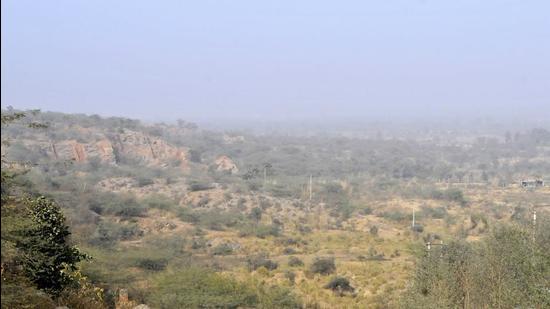Work on final biodiversity registers starts after Covid-19 delays
The registers will serve as a repository of information on plants, animals, and crops, along with traditional knowledge of their place in local ecosystems
A year and a half after an expert committee was formed by the Gurugram administration, work on developing the final people’s biodiversity registers (PBR) started on Monday, officials said. As part of the project, PBRs of 47 villages, 36 in Gurugram and 11 in Faridabad, falling in the Aravallis will be completed by October.

PBRs are techno-legal documents that will serve as a repository of information on plants, animals, and crops, along with traditional knowledge of their place in local ecosystems. As per the Biological Diversity Act, 2002, every urban local body (ULB) in the country is mandated to prepare such a register for areas within their jurisdiction through biodiversity management committees (BMC).
A total of 6,437 such BMCs have been formed across various urban local bodies in Haryana including, 203 in Gurugram. “In Haryana, BMCs were constituted around one-and-a-half years ago and primary PBRs were under preparation. Now, we have engaged technical support groups to help the BMCs. We have also constituted a state-level PBR quality monitoring committee and their members visited a few villages in Gurugram on Monday to assess whether the PBRs are being prepared properly or not,” said Vineet Kumar Garg, the chairman of Haryana State Biodiversity Board.
The committee visited Tikli, Gairatpur Bas and Hasanpur villages in Gurugram district on Monday, while on Tuesday, the committee visited Mangar, Kot and Pali villages in Faridabad district.
Sunil Harsana, a Faridabad-based wildlife researcher with expertise in the conservation of biodiversity, is working with the state biodiversity board for the formation of the final PBRs in Aravalli villages. A biologist, Samarth Khanna, an expert in identifying plants and wildlife of Aravallis, is also working alongside Harsana.
“Until now, Haryana did not have a formal record of its local biodiversity and there is a lot still to be known about the Aravallis. These PBRs will help us maintain these records as traditional knowledge and will be registered in government records. Once it is known that a particular species of plant, crop or wildlife is found in a region, and it is documented, an interest can be generated among locals to save that species. Even if a commercial set-up is exploiting those resources, they would have to give compensation to the locals,” said Harsana.
Last year, draft PBRs were formed but they were found to be lacking quality and rigour, officials said. The work also got delayed due to the lockdowns to contain the Covid-19 pandemic. PBRs rely on field inspections, as well as secondary data obtained from line departments of forest and wildlife, agriculture, fisheries, horticulture and animal husbandry departments.



